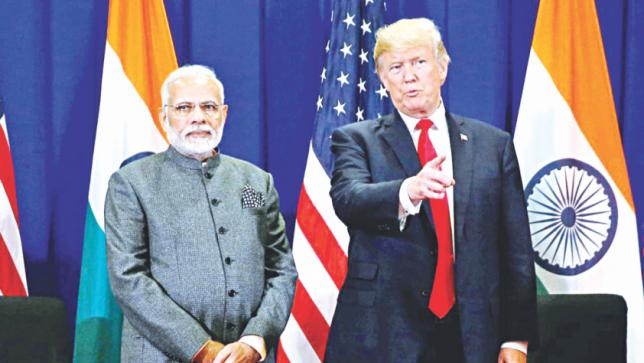US considers withdrawal of zero tariffs for India

India could lose a vital US trade concession, under which it enjoys zero tariffs on $5.6 billion of exports to the United States, amid a widening dispute over its trade and investment policies, people with close knowledge of the matter said.
A move to withdraw the Generalised System of Preferences (GSP) from India, the world's largest beneficiary of a scheme that has been in force since the 1970s, would be the strongest punitive action against India since President Donald Trump took office in 2017 vowing to reduce the US deficit with large economies.
Trump has repeatedly called out India for its high tariffs.
Indian Prime Minister Narendra Modi has courted foreign investment as part of his Make-in-India campaign to turn India into a manufacturing hub and deliver jobs to the millions of youth entering the workforce.
Trump, for his part, has pushed for US manufacturing to return home as part of his Make America Great Again campaign.
The trigger for the latest downturn in trade ties was India's new rules on e-commerce that restrict the way Amazon.com Inc and Walmart-backed Flipkart do business in a rapidly growing online market set to touch $200 billion by 2027.
That, coming on top of a drive to force global card payments companies such as Mastercard and Visa to move their data to India and the imposition of higher tariffs on electronic products and smartphones, left a broader trade package the two sides were working on through last year in tatters.
The GSP was tied to the trade package and since that deal had slipped further away, the United States was considering withdrawing or scaling back the preferential arrangement, people familiar with the matter said.
The US Trade Representative (USTR) was completing a review of India's status as a GSP beneficiary and an announcement was expected over the next two weeks, they said.
“(The two sides) were trying to sort out the trade package, but were not able to actually finish the deal. In the meantime these other things, data localisation and e-commerce, have come along,” one of them said. “In a sense it's like someone has rained on the parade.”
India and the United States have developed close political and security ties. But bilateral trade, which stood at $126 billion in 2017, is widely seen to be performing at nearly a quarter of its potential.
US Commerce Secretary Wilbur Ross is due in New Delhi next week where he is expected to raise concerns about the e-commerce policy and data localisation, officials said.
New Indian rules announced in December for the e-commerce sector banned companies such as Amazon and Flipkart from striking exclusive deals with sellers, restricted their ability to offer discounts and barred them from selling products via vendors in which they have an equity interest.
The move disrupted product listings on Amazon's India website and forced it to change its business structures. Amazon and Walmart, as well as the US government, had lobbied against the move, Reuters reported earlier.
